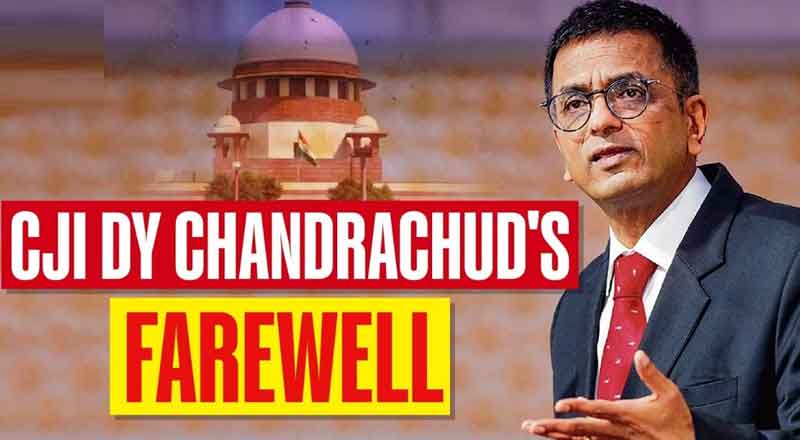A Lifetime in the Judiciary Comes to a Close
On a historic Friday, Chief Justice of India (CJI) DY Chandrachud bid farewell to the Supreme Court and his distinguished career, leaving behind a legacy of landmark judgments and steadfast commitment to justice. Appointed as the 50th CJI on November 9, 2022, his two-year tenure has been marked by significant contributions to constitutional law and social justice in India. Addressing the courtroom from the ceremonial bench, Chandrachud reflected on his journey, the challenges of the role, and his commitment to the ideals of fairness and equality. “I won’t be able to deliver justice from tomorrow, but I am content,” he stated, embracing the transition with gratitude and grace.
Chandrachud’s farewell speech was a deeply personal reflection on his life in the judiciary, a career spanning over four decades. He recounted the “pilgrimage” that judges undertake each day, stepping into the courtroom with humility and dedication to uphold the Constitution. “The work we do can make or break cases,” he said, comparing the pursuit of justice to a daily act of devotion. In a humorous aside, he shared a light-hearted moment with his registrar about the timing of the farewell, demonstrating his unassuming personality and connection with his colleagues.
Reflecting on Highs and Lows with Humor and Resilience
Known for his empathy and a profound sense of responsibility, Chandrachud candidly discussed the intense scrutiny he faced during his tenure. He humorously acknowledged being “one of the most trolled judges,” remarking that his critics would “be unemployed” once he stepped down. Despite the online vitriol, he remained unfazed, accepting the attention with characteristic resilience. “My shoulders are broad enough,” he quipped, illustrating his ability to shoulder criticism without allowing it to detract from his mission.
Throughout his tenure, Chandrachud confronted numerous challenges, including contentious cases and external pressures. Yet, his leadership was defined by collegiality and mutual respect with fellow judges. “There was never any difference of opinion between us,” he noted, highlighting the unity within the judiciary even in moments of difficult decisions. Justice Sanjiv Khanna, his successor, lauded Chandrachud’s commitment to the marginalized and vulnerable, acknowledging the transformative impact of his judgments.
Five Landmark Judgments that Defined Chandrachud’s Tenure
Justice Chandrachud’s legacy is anchored in pivotal judgments that reshaped Indian jurisprudence, advanced civil liberties, and reaffirmed democratic principles. His judicial philosophy emphasized strengthening constitutional protections and safeguarding the rights of individuals. Among his most influential verdicts, these five stand out as pillars of his legacy:
Government of Delhi’s Authority Affirmed
In a significant ruling in 2018, revisited in 2023, Chandrachud upheld the authority of the National Capital Territory (NCT) Government of Delhi over administrative matters. This judgment reinforced the principle of federalism, affirming the autonomy of state governments in governance. The decision emphasized the balance of power between the central and state governments, a critical aspect of India’s federal structure.
Marriage Equality Plea
As CJI, Chandrachud presided over the case of Supriya Chakraborty v. Union of India (2023), a landmark case concerning marriage equality for LGBTQ+ individuals. He expressed support for recognizing civil unions but ultimately deferred the decision on full legal recognition to the legislature. While the court refrained from redefining marriage, Chandrachud’s stance signaled a progressive shift towards inclusivity and rights for LGBTQ+ couples.
Upholding the Abrogation of Article 370
Chandrachud’s bench upheld the abrogation of Article 370, a decision that continues to impact Jammu and Kashmir’s status within India. This 2023 ruling addressed the controversial move to remove the special status of the region, a decision that underscored Chandrachud’s commitment to interpreting the law in the broader interest of national integration and security.
Striking Down the Electoral Bonds Scheme
In the Association for Democratic Reforms v. Union of India case (2024), Chandrachud declared the Electoral Bonds Scheme unconstitutional, emphasizing transparency in political funding. His judgment underscored the voters’ right to information, a vital component of democratic governance, and aimed to curb the influence of opaque political financing ahead of the national elections.
SC/ST Sub-classification Allowed
In a ruling in 2024, Chandrachud permitted states to introduce sub-classifications within the Scheduled Castes and Scheduled Tribes (SC/ST) categories. The judgment, State of Punjab v. Davinder Singh, allowed affirmative action to address disparities within disadvantaged communities, provided empirical evidence justifies the need. This decision has significant implications for social equity, addressing “backwardness within backwardness” to ensure fair representation.
A Legacy of Strengthening Democratic Values
Chief Justice Chandrachud leaves a lasting impact on India’s legal landscape. His judgments have advanced civil liberties, promoted social justice, and defended democratic principles. His focus on constitutional values, as seen in these cases, has fortified the judiciary’s role in upholding citizens’ rights. In his farewell, he paid tribute to the “great judges who have adorned this court,” acknowledging the lineage of wisdom and integrity he inherited and upheld.
Justice Chandrachud’s tenure reflects his vision for a judiciary that is compassionate, independent, and deeply connected to the needs of the marginalized. His successor, Justice Sanjiv Khanna, will carry forward this mission, a transition that Chandrachud welcomed with confidence. “The baton has been passed into capable hands,” he stated, expressing optimism for the future of India’s judiciary.
A Journey Marked by Dedication and Compassion
As he steps down, Chief Justice DY Chandrachud leaves behind a legacy marked by wisdom, humility, and a profound commitment to justice. His decisions resonate not only within the corridors of the Supreme Court but also in the lives of countless Indians whose rights and freedoms he defended. Through humor, resilience, and an unwavering dedication to constitutional ideals, Chandrachud exemplified judicial leadership. As India’s judicial landscape evolves, his tenure will be remembered as a testament to the power of law to uphold equality, integrity, and the spirit of democracy.
(With inputs from agencies)





